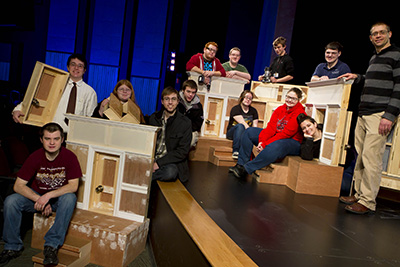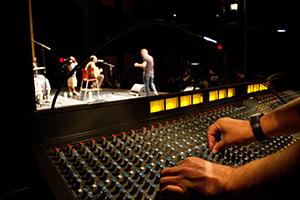
New England School of Communications at Husson University
New England School of Communications (NESCom) at Husson University, located in picturesque Bangor, Maine, offers one of the only four-year degrees in live sound on the planet. The program, which culminates in a Bachelors of Science in Live Sound Technology, melds academic instruction in audio, electronics, and music, with hands-on training in mixing, system optimization, and event management.
The program offers a mixture of classroom and hands-on learning. Most courses include weekly small group labs, in which theoretical concepts learned in the classroom are put to practical use on real equipment in a working venue. In addition, many courses include independent practice labs, in which students hone mixing and system optimization skills alone or with partners. A notable component of the program is the significant involvement of students at a variety of regular events. From mixing concerts in the beautiful Gracie Theater to engineering sporting events in the NESCom Mobile Productions remote broadcast truck, Live Sound students build their skills through challenging and rewarding real-world experience.
SoundGirls.Org talked with Eric Ferguson Director of the Audio Program at NESCOM to find out more.
What is the objective of the BA program?
The goal of the NESCom Live Sound program is to prepare students to begin their careers with the knowledge and practical skills required for success in the live audio industry. While it is true that many in the business did not receive academic instruction in Live Sound before embarking on their careers, we believe entering the business already equipped with fundamental knowledge, skill sets, and soft skills, can accelerate an individual’s career.
Of course, the live audio industry is very broad, including touring, broadcast, theatrical, house of worship, and system installation worlds. In the face of this, the NESCom Live Sound Technology concentration is diverse in its curricular approach. In addition to learning audio fundamentals and equipment operation, students are introduced to the essentials of music, power and grounding, system optimization, video production essentials, RF management, stage lighting, Pro Tools operation, digital networking, production management, and more.
Can you walk us through the four-year program?
The New England School of Communications (NESCom) Audio department offers two concentrations, Audio Engineering (studio recording), which focuses on the Recording Arts and prepares students for careers in music and post-production, and Live Sound Technology. NESCom also offers programs in Video Production, Radio Broadcasting, Entertainment Production, Web Media, Journalism, Sports Journalism, and Marketing Communications. The larger University also offers a variety of other programs. These other majors are great sources of elective coursework for Live Sound students.
The first year of both the Audio Engineering (studio recording) and Live Sound Technology programs is identical in coursework, allowing students time before they choose a major. In this first year, students take an introductory audio theory course, a lab in which they learn basic analog console operation and mixing, a Pro Tools I course, and a survey course in Music Structure and Style. All students also take Introduction to Live Sound in their first year. This class, with separate lecture and lab components, offers a survey of the live audio industry, in-depth instruction on analog console operation, and practical instruction in equipment setup and operation in a concert environment.
In the second year, students take Live Sound II, learning more about microphones, wireless technology, and theatrical audio essentials. In the Live Sound II lab, students are introduced to digital console operation, RF management techniques, and setup for concert, sporting, theatrical, and other events. Students in Live II also are required to work as crew members at multiple, diverse events. Live Sound III is also usually taken in the second year. In this course, students learn basic electrical theory, the essentials of power and grounding, and advanced audio theory while simultaneously honing their mix skills in personal labs and at events. Other important classes in this year include Fundamentals of Stage Lighting and Video Production I.
In year three, students take an advanced console course, called Digital Audio for Live Sound, advancing their music and broadcast mix skills on a variety of large format consoles. In the Sound Reinforcement & Speaker Systems, students learn the essentials of system design and optimization, diving deep into phase, the construction of arrays, and use of Rational Acoustics Smaart and Meyer MAPP. Also in the third year, students increase their electrical knowledge and soldering skills in the Stage Wiring & Electronic Troubleshooting class. Additional concentration courses in the third year include a digital networking survey course, and a Worksite Safety class in which students learn safe tool operation, rigging essentials, stage safety concepts, and earn an OSHA safety certification.
In their fourth year of study, students polish off their skills with significant involvement as mixers and production managers at events. An important course is Live Sound Mixing, in which students focus on music and broadcast mixing, employing consoles such as a Midas Pro 3, Avid Profile, Yamaha PM1D, ATI Paragon, and Yamaha CL3. Also in this class, students begin to function as Event Leads. Event Leads work as production managers at events, completing all advance work before the gig and leading all setup, troubleshooting, and breakdown. Culminating year four is the Live Performance Production course. In this class, students continue building mix skills, leading events, and building upon such previously learned knowledge on subjects such a monitor mixing, RF management, system optimization, troubleshooting, digital interfacing, and more.
In addition to the courses listed above, students are required to take a variety of General Education and core communication courses. These classes are taken across the four-year program.
Do you offer certificate or Associate Degree programs?
The program is currently a Bachelors of Science only.
Who should apply and how do they apply?
To apply, interested candidates should visit the Husson University website and click the Prospective Students link.
How long does the course/program take to complete?
The program is designed to take four years, but transfer students with existing college coursework often complete it in three.
When is it offered?
Live Sound Technology courses are typically offered in the spring and fall semesters.
How much is classroom based and how much hands on?
Each course is different, but the ratio is often 50/50, with half of the time spent in a traditional lecture and setting, the rest in a hands-on lab. This approximation does not include event participation though. The typical Live Sound student works three to five daylong events per semester, all of which is hands-on in nature.
What kind of background or experience does one need before applying?
No knowledge of audio or music is required to enter or excel in the Live Sound Technology concentration. Students do need to meet the entrance requirements of Husson University.
What is the average age of students?
All ages are welcome, but students in the program typically range from 18 to 22 years old.
Do you offer job placement assistance?
NESCom Live Sound alumni work throughout the live audio industry, at businesses such as Clair Global, Carnival Cruise Lines, Norwegian Cruise Lines, Disney, Rainbow Sound, and Black Hawk Audio. The university does offer job placement services, and Live Sound instructors are regularly involved with helping graduates find work.
For tutition costs and financial aid
Please visit the Husson website for the most up-to-date costs: The University offers a variety of forms financial assistance.
Lastly, those interested in an education in live sound, should surely check out the program’s website: At the site, a variety of equipment lists, videos, course descriptions, links, and more can be found.

